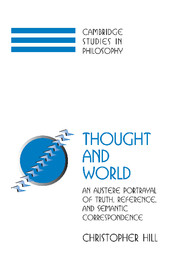Book contents
- Frontmatter
- Contents
- Acknowledgments
- 1 Introduction
- 2 Truth in the Realm of Thoughts
- 3 The Marriage of Heaven and Hell: Reconciling Deflationary Semantics with Correspondence Intuitions
- 4 Indexical Representation and Deflationary Semantics
- 5 Why Meaning Matters
- 6 Into the Wild Blue Yonder: Nondesignating Concepts, Vagueness, Semantic Paradox, and Logical Paradox
- Notes
- Index
3 - The Marriage of Heaven and Hell: Reconciling Deflationary Semantics with Correspondence Intuitions
Published online by Cambridge University Press: 07 December 2009
- Frontmatter
- Contents
- Acknowledgments
- 1 Introduction
- 2 Truth in the Realm of Thoughts
- 3 The Marriage of Heaven and Hell: Reconciling Deflationary Semantics with Correspondence Intuitions
- 4 Indexical Representation and Deflationary Semantics
- 5 Why Meaning Matters
- 6 Into the Wild Blue Yonder: Nondesignating Concepts, Vagueness, Semantic Paradox, and Logical Paradox
- Notes
- Index
Summary
INTRODUCTION
Simple substitutionalism maintains that the content of the concept of truth is fully captured by the following explicit definition:
(S) For any x, x is true if and only if (Σp)((x = the thought that p) and p),
where Σ stands for existential substitutional quantification. It also asserts that it is possible to give similar explanations of other semantic concepts. Thus, among other things, simple substitutionalism asserts that the concepts of reference and expression can be defined as follows:
(SR) For any object x and any object y, x refers to y if and only if (ΣΣa)(the concept of a is a singular concept and x = the concept of a and y = a).
(SE) For any object x and any object y, x expresses y if and only if (ΣF)(the concept of a thing that is F is a monadic general concept and x = the concept of a thing that is F and y = the property of being an F).
As we saw in the last chapter, simple substitutionalism has some extremely important virtues.
AN OBJECTION TO CLASSICAL DEFLATIONISM
Unfortunately, despite its virtues, simple substitutionalism appears to be at odds with certain of our intuitions about truth. Thus, it appears that we have intuitions to the effect that, in a wide range of cases, thoughts mirror or correspond to extraconceptual circumstances, and that within this range of cases, when a thought counts as true, it does so in virtue of the fact that the corresponding circumstance actually obtains.
- Type
- Chapter
- Information
- Thought and WorldAn Austere Portrayal of Truth, Reference, and Semantic Correspondence, pp. 38 - 57Publisher: Cambridge University PressPrint publication year: 2002



